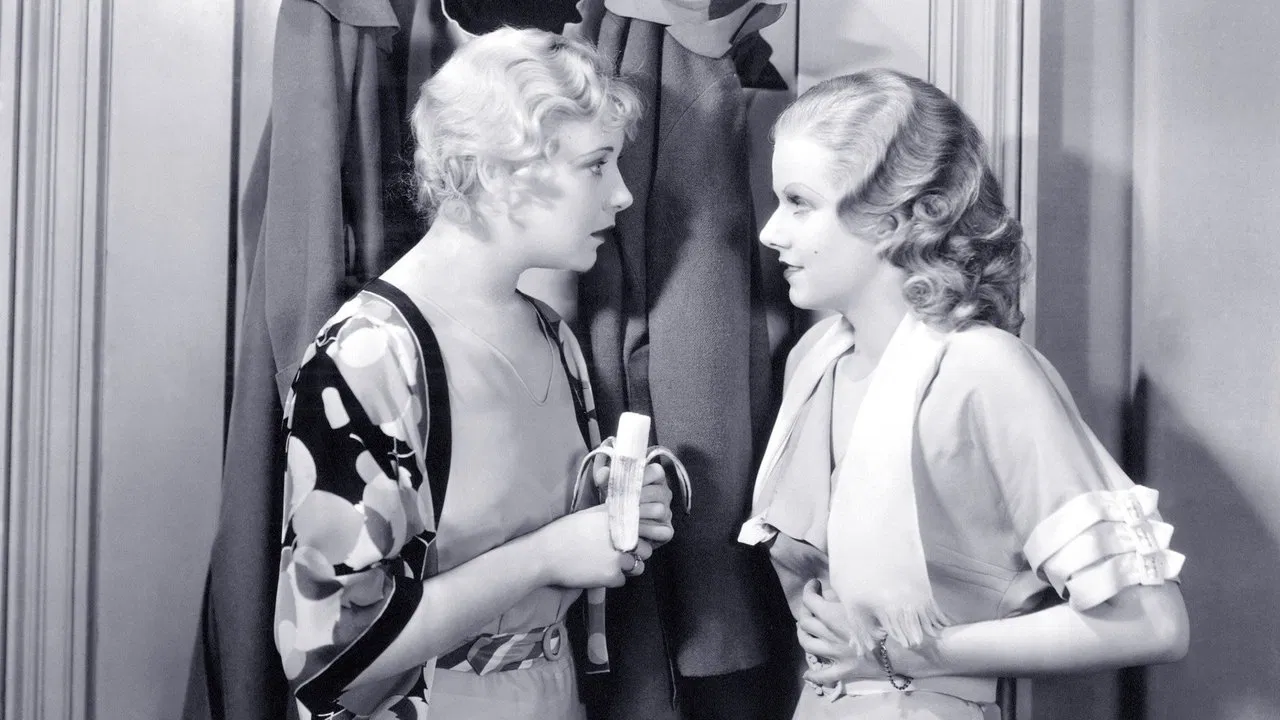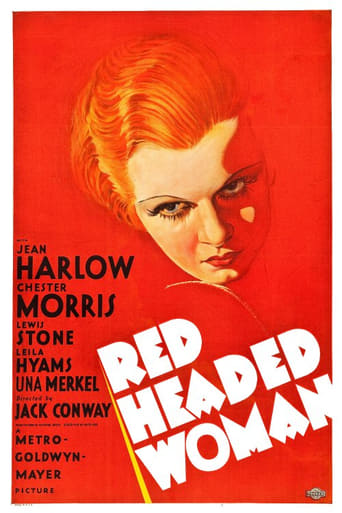

Please don't spend money on this.
... View Moredisgusting, overrated, pointless
... View MoreThe movie really just wants to entertain people.
... View MoreStrong acting helps the film overcome an uncertain premise and create characters that hold our attention absolutely.
... View MoreShortly before Mae West fizzled the screen with Paramount's 1933 releases of both SHE DONE HIM WRONG and I'M NO ANGEL, Jean Harlow (1911-1937) starred in a somewhat daring product titled RED-HEADED WOMAN (Metro-Goldwyn-Mayer, 1932), directed by Jack Conway, with screenplay by Anita Loos, from the book by Katherine Brush. It was Harlow's most breakthrough, pre-code production for its time. While such a title that might have been better suited for comedienne, Lucille Ball, a decade later, the situations on the other hand depicted in this screenplay is another story. Oddly enough, RED-HEADED WOMAN was labeled into Harlow's character, whose earlier movie title, PLATINUM BLONDE (Columbia, 1931), for which she also appeared, has become her lifelong trademark slogan. Though she did retain her blonde hairstyle throughout her short-lived movie career, as a "red-headed woman," Harlow shows she's not just another blonde but a sex-craved girl who's loose morals are simply "red hot." As an off-screen male vocalist sings the title song during the opening credits (and visually reprized later on), the story introduces Lil Andrews (Jean Harlow) in a beauty parlor getting her hair dyed red and then buying a new sexy transparent dress at a department store to impress her office employer, Bill Legendre (Chester Morris). Working as his secretary for two months, and knowing full well that he's happily married to his wife, Irene (Leila Hyams), who happens to be out of town in Cleveland with Bill's Aunt Jane (May Robson), Lil takes it upon herself to take some letters work to his home as a friendly gesture. In doing that, she catches Bill off guard and comes on to him. At first Bill resists her, but weakens through a series of kisses. His weakness leads to a surprise early arrival by Irene later that night, for which Lil makes a drastic exit from Bill's home hours after her arrival. Hearing the news and hoping to have the marriage saved, Bill's father William Legendre Sr. (Lewis Stone) arranges to have "a girl like that" transferred to the Cleveland office. With Lil refusing to part with Bill, the young adulteress succeeds in having the couple divorce, with Bill not only becoming her husband, but arranging for them to take up residence in a home directly across the street from his ex-wife. Lil, now affectionately called "Red" by Bill, does everything possible breaking into high society and meeting the right kind of people, even to a point of phony tearful outbursts. When Lil finally tires of Bill and her marriage, she soon finds other interests.Though there are serious overtones found in RED-HEADED WOMAN, especially moments involving the poor wife (Hyams), it's virtually a comedy of loose immorality and double-meaning dialogue told from the secretary's point of view. Una Merkel's Sally offers typical best girlfriend/roommate support whose character virtually gives surprising gasps throughout much of Harlow's proceedings. Harlow and Merkel certainly must have gotten some gasps from critics and theater patrons alike during their negligee stripping sequence by which the camera shifts upward to hide the proceedings.Also in the cast is Henry Stephenson as Charles B. Gaerste, a conservative friend of the Legendre family, who falls victim of Lil's girlish charms, and Charles Boyer playing Gaerste's chauffeur. Although Boyer, early in his career and slightly unrecognizable, has little to do, he does take part in the important epilogue set two years later in Paris for a very much surprised finish. Harvey Clark (Fred); William Pawley (Al, Lil's bootlegger boyfriend); Henry Armetta (The Waiter) and Edgar Norton (The Butler) round up the rest of the cast.When I first stumbled upon RED-HEADED WOMAN, it was while attending the New York City revival movie house of Regency Theater located on Broadway and 68th Street around 1980. Having no knowledge of what's now categorized as "pre-code" movies, I was very much surprised by this one, especially the fact it was released at all. Aside from that, I also observed reactions from others in attendance, and at one point during the midway point, noticing an middle-aged man walking out of the theater saying angrily to himself, "No morals. No morals!" Aside from seeing other patrons doing the Una Merkel "gasps" reactions themselves, the biggest roar of laughter took place in a scene where Gaerste (Stephenson) is shown by Bill how he's been duped by Lil while showing him some still photographs taken by a private detective indicating her activities, literally, behind his back! Four years later, Jean Harlow assumed the profession of secretary once again in WIFE VS. SECRETARY (1936), opposite Clark Gable, Myrna Loy, James Stewart and May Robson. As much as that title might have been appropriately used over RED-HEADED WOMAN, the 1936 drama, produced after the production code was enforced, was very much opposite in tone. Unlike the sex-starved, bra-less Lil Andrews, WIFE VS. SECRETARY shows Harlow off in a totally different, most refined style instead, which makes the 1936 movie a very interesting treat to behold on Harlow fans.Years later, RED-HEADED WOMAN surfaced on cable television, including Showtime (1984), Turner Network Television (1989-1992), before becoming a permanent fixture, thus far, on Turner Classic Movies. Formerly distributed to home video as part of the Forbidden Hollywood series, RED HEADED WOMAN has become available on DVD, with WATERLOO BRIDGE (Universal, 1931) on its flip side. Due to the boss and secretary theme, on a personal level, RED-HEADED WOMAN should have been placed as a companion piece with another pre-code product, BABY FACE (Warner Brothers, 1933), starring Barbara Stanwyck and George Brent, instead. (***)
... View MoreJean Harlow oozes sensuality as a woman from the wrong side of the tracks who tries to get her boss to hook up with her...and proceeds to have still MORE affairs. "Red-Headed Woman" got made before the infamous Hays Code's establishment, meaning that it contains what had to be some of the most erotic things commercially filmed by that point (which means that it's only PG in our era). Sure enough, once the Hays Code came about, the movie got pulled from circulation and wasn't shown again for years. A real pity, since it's got some really funny stuff. In the 21st century, when we can find all sorts of porn and crude humor on the Internet, it's hard to believe that there was ever a set of rules dictating what movies were allowed to show, but there was just that. As always, the moralizers prevent people from having any fun.Anyway, it's a pretty funny movie.
... View More"Red Headed Woman" released in 1932 by MGM, is all about Jean Harlow. Harlow came to MGM under the guide of Irving Thalberg, the boy wonder of the studio. Louis B. Mayer, a conservative man, initially wanted nothing to do with Harlow. He felt her image was that of a bimbo, but Thalberg held considerable power at the studio, and he made Harlow a star. In this film, one of several she made that year, Harlow plays a tough gal from the wrong side of the tracks. Her goal is to be rich, and she will use her "assets" to do so. Harlow sets out to seduce her boss (Chester Morris) who is very serious-minded and very married. Next thing you know, he's divorcing his wife and is now with Harlow. Not satisfied with this conquest, Harlow sets her sights on New York and shamelessly seduces a very rich (and yes, married) businessman (Henry Stephenson). It all gets quite complicated, with more men and eventually her husband getting wise to her games. But Harlow is a wonder here, with her tough talk and great accent, she rules the film. Matters such as marital infidelity and sex are not disguised, as this was two years before the code of 1930 would clamp down on the movie industry. In fact, this film was one of several which outraged the moralists and eventually lead to the 1934 censorship rules. Anyway, see the film for Harlow. Some good supporting performances, including Una Merkel as Harlow's wise-cracking friend, and Lewis Stone, playing Chester Morris' father.
... View MoreFun pre-code comedy starring Jean Harlow. Harlow plays an ambitious redhead who has a crush on her married boss (Chester Morris). He's a moral guy, loves his wife and everything, but Harlow is just so insistent that she finally succeeds in seducing him. Thus ends his first marriage and begins his second. Unfortunately for him, Harlow doesn't quite get the concept of monogamy. The film has a weird balance of comedy and drama, but I'd say it's mostly a comedy. In fact, I'm pretty sure that it's supposed to be entirely a comedy. What this film really needed was Ernst Lubitsch his infamous "touch" could have made this into a classic. As it is, it's quite good.
... View More